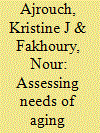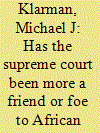|
|
|
Sort Order |
|
|
|
Items / Page
|
|
|
|
|
|
|
| Srl | Item |
| 1 |
ID:
121886


|
|
|
|
|
| Publication |
2013.
|
| Summary/Abstract |
The purpose of this study was to provide a critical perspective on the needs of aging Muslims by focusing on a diverse group of older adults including those with ancestry from African American, South Asian, Arab, and Albanian origins. Four focus group discussions were conducted with adults aged 60+ recruited from four Muslim centers in the metro-Detroit area. Grounded analysis uncovered themes related to needs, strengths and challenges in the Muslim community, as well as suggestions for the way forward in addressing aging issues. Needs identified include quality of life and social relations. Strengths included references to tradition and scripture. Challenges named referred to conflict both within and outside of the family. Finally, the way forward consisted of the desire for options to support aging families within the community, often in small steps, though not necessarily only through mosques. Findings also suggested that women may be a key agent of change within the Muslim community. In sum, this study uncovered areas of overlap and at times disagreement between and within groups, underlining the fact that there is no one kind of Muslim aging, and that any approach to caring for Muslims must combine cultural sensitivity with flexibility in order to minimize anxiety and stress for both elders and their families.
|
|
|
|
|
|
|
|
|
|
|
|
|
|
|
|
| 2 |
ID:
107663


|
|
|
|
|
| Publication |
2011.
|
| Summary/Abstract |
With establishment of the U.S. Selective Service System in 1917, selective draft rules placed consideration of registrants' economic obligations to their dependents front and center. By observing the Canadian and British recruitment experiences, American policy makers opted against universal conscription since they believed it would be costly because of the need to offer family allowances and opted against a voluntary system since they believed that too many bachelors would fail to volunteer. Dependency deferments were designed to minimize the social and economic costs of war. Local board members determined whether a man was a genuine breadwinner or not, and individual discretion on this matter contributed to the higher rates of African American draftees during WWI compared to white draftees, since African American men were less likely to be recognized as genuine breadwinners. Selective Service rules thus resulted in reproducing female citizens as economic dependents and yielded durable inequalities among registrants.
|
|
|
|
|
|
|
|
|
|
|
|
|
|
|
|
| 3 |
ID:
104556


|
|
|
| 4 |
ID:
169417


|
|
|
|
|
| Summary/Abstract |
This essay traces the arc of Black American solidarity with Palestine, placing the phenomenon in the context of twentieth-century African American internationalism. It sketches the evolution of the political imaginary that enabled Black activists to depict African Americans and Palestinians as compatriots within global communities of dissent. For more than half a century, Black internationalists identified with Zionism, believing that the Jewish bid for a national homeland paralleled the African American freedom struggle. During the 1950s and 1960s, however, colonial aggression in the Middle East led many African American progressives to rethink the analogy. In the late 1960s and the 1970s, African American dissidents operating within the nexus of Black nationalism, Pan-Africanism, and Third Worldism constructed powerful theories of Afro-Palestinian kinship. In so doing, they reimagined or transcended bonds of color, positing anti-imperialist struggle, rather than racial affinity, as the precondition of camaraderie.
|
|
|
|
|
|
|
|
|
|
|
|
|
|
|
|
|
|
|
|
|